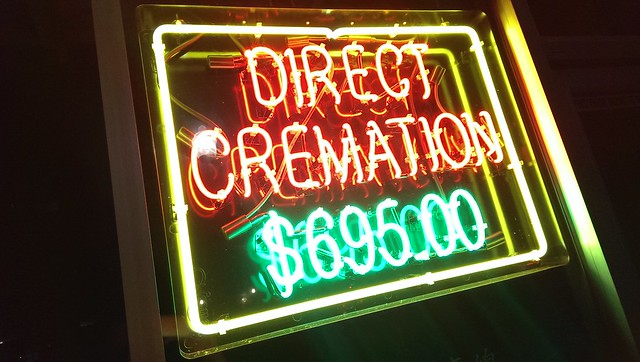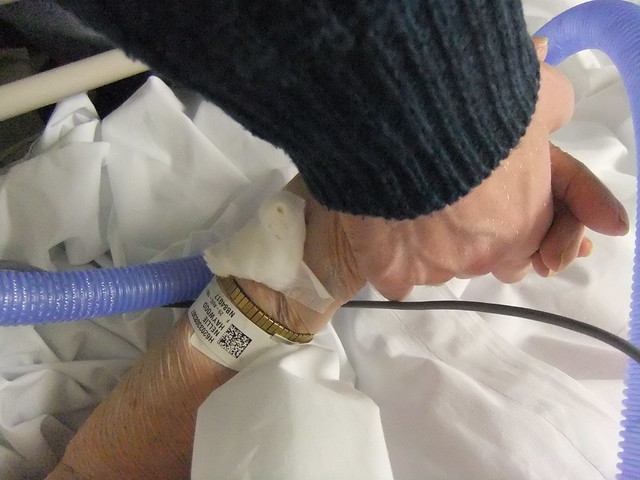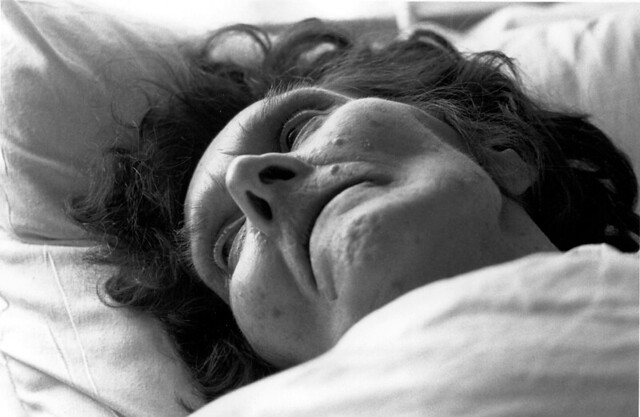Death
How Death and Dying Changed My Perspective on LGBT Rights
I didn’t grow up in a context where the LGBT community was generally accepted. I suppose that many in my generation (and those before us) experienced a time when they were (or continue to be) either indifferent or against LGBT rights.
Like many people my age, I experienced a conversion of sorts from being anti LGBT rights to being an advocate for them. My “conversion” was gradual and — like the conversion of many heterosexuals — it involved meeting, befriending and loving people who identify as LGBT. Today, I consider some of my best friends to be gay, lesbian and trans.
But, perhaps the largest influence in my conversion was the practical implications that I witnessed as a funeral director surrounding death and dying.
As a principle, I believe that those who love us in life should be the ones who take care of us in death.
In places that lack LGBT rights, that simple principle is denied to committed LGBT couples.
Without a legal recognition of marriage, a gay or lesbian couple doesn’t have the next-of-kin right to make funeral arrangements. That right either falls to the deceased’s children and / or parents. And too often — and I believe this is changing — those parents or children barred the deceased’s partner from any involvement in the funeral. I’ve seen this circumstance play out on a number of occasions. It’s hurtful, it’s difficult and it’s intrinsically wrong.
Again, if you loved and committed yourself to someone in life, that love and commitment and care should extend to death.
Not only were the bereaved LGBT partners denied funeral arrangement rights, they were also denied
social security benefits,
next-of-kin hospital visitation rights,
spousal funeral and bereavement leave,
next-of-kin status for emergency medical decisions,
government death benefits
and inheritance rights.
Today is a good day. Today, love can extend from life to death.
Today, America recognizes that those who love us in life can ALSO be the ones who take care of us in death.
10 Reasons You MUST Have a Funeral

© 2013 Justin Dolske, Flickr | CC-BY-SA | via Wylio
Many people tell me “I don’t want a funeral. Just burn my ass and throw me in the woods.”
But funerals are both much deeper, much more important and much broader than most of us assume. They’re neither “just for the living” nor must they be the traditional viewing, priest, eulogy and funeral director format (although none of these things are bad … especially the funeral director *wink* *wink*). Funerals can be both deeply spiritual events and celebrations mixed with music, poetry and beauty.
Here are 10 things that give funerals both a deep and broad sense of meaning and value:
Individual Celebration / Mourning
The internet/Facebook/TV give us so many amazing stories. And the negative is that they give us so many stories! It’s like a smorgasbord of narratives and it’s easy for the individual to get lost among the celebrities, the pop sensations, the stars and the pro athletes. But it’s the individuals that make our community run and their stories get overshadowed … except at funerals, when we can rope off the smorgasbord, turn down the volume, ignore Kim Kardashian’s latest stunt, turn our cell phones off and celebrate and mourn one life.
Hope infusion
Sigmund Freud stated that you have two choices: accept death or deny death. Freud also believed that religion was often a neurotic attempt to deny the reality of death. And, to some degree he’s right. But, when we look for hope, when we look for transcendence and when we look for immortality in the face of death, it doesn’t always fit into Freud’s binaries … it’s possible to accept death through some form of hopeful transcendent understanding of death.
Whether that hope is in heaven, or in the continuation of the deceased’s family or a more natural (i.e. green burial) type of orientation, or all of the above, it’s important that we find hope through the message of a funeral. Hope is what gives a funeral special meaning that helps us rise from the pits of darkness.
Value Affirmation
Death creates a hole in our lives and our world. It’s like an earthquake that shakes the world we once knew. Funerals are a time when we can reaffirm meaning, love, community, goodness and even humor. They allow us a space to come together and affirm that life is changed, but it still continues on. Funerals are a storytelling practice that keeps the identity of our family alive even when one of our members has died.
Drunk Eulogies
In my many years as a funeral director, there are few things that are more gratifyingly awkward and entertaining than a spontaneous drunk eulogy. Someday I’ll video one of these events, lawyer up and put it on YouTube.
Human dignity
To deny a person a funeral is to deny them an act of dignity.
Tony Walter writes “(funerals) mark that something valuable, a human life, has passed. Whatever else a funeral does or does not do, it must do this.”
This explains why so often impoverished and/or marginalized peoples will spend proportionately exorbitant amounts of money and time on the funerals of family and friends. They have been so devalued in life, that the funeral acts as one final statement of dignity. On the other hand, in a culture like the West — where we sit in social hegemony – we see less need for the dignity of a funeral; thus direct cremation, direct burial, etc..
Public acknowledgement of life and death
We like things to be private. And there’s good reason. Being public with our opinions, our religious values and even our sports teams get’s messy. But if we live in community, we die in community. And funerals give the community a time to come together an grieve, because …
Grief shared is grief diminished
The more we can share our grief, the more we can allow others to reach out to us, the more we allow ourselves to be vulnerable and accept help and love, the healthier we can walk through our bereavement.
Transition
On a psychological level, funerals and disposition (especially when the body is present), help us to see and accept death. Without a funeral that acknowledges the death of our loved ones, the dead can too easily become psychological ghosts. Funerals transition the deceased from alive to dead, and help us on the path to accepting the death of a loved one.
Ritual
The walls of bereavement are very intimidating to even the spiritually and psychologically strong. It doesn’t matter how strong you are, you will fall and you will fail.
Unless you enter through the trodden paths of ritual.
The muscle memory of grief is ritual. Like the masterful pianist who makes impossible tasks seem natural, so ritual allows us to take the incredibly difficult task of mourning and gives us a way to persevere, even when it seems we shouldn’t.
Free food from post funeral luncheon
Aunt Eunice’s special potato salad. Uncle Bob’s homemade mead. Grandma’s collard greens. Good Lord. Pass the baked beans.
Six Good Things About Embalming and Restoration

© 2009 Nathan Jongewaard, Flickr | CC-BY | via Wylio
Morticians have been taught that embalming is the foundation of the funeral business. That without embalming … we’d be buried. During the modernization of America and at the beginning of the “American way of death”, embalming was the foundation. But we no longer exist in a modern paradigm, we exist in plurality and fragmentation with “American ways (!) of death”.
I don’t think the funeral profession’s survival depends on embalming nor do I think embalming is the pinnacle of a good funeral. England, Canada and Australia are examples of industries that exist without the centrality of embalming. And it would be very neocolonialist of us to assume that our way of embalming represents the best and only way for healthy funeralization.
Despite this preface, I do believe embalming and restoration is valuable. Here’s some short history of the practice as well as some possible benefits of embalming and restoration that I’ve observed.
One. Children.
The fact that my wife and I are infertile has — for some reason — made me extra sensitive to the sight of dead children … or at least that’s the reason I give for the sickness I feel when seeing a child’s corpse.
He was three years old. An all too young victim of cancer. I returned from the Children’s Hospital with his withered corpse and found my grandfather — dressed in his embalming gear — awaiting me in the morgue. That day we had a couple death calls and I had other work to do, so I left my grandfather alone to embalm this young body that had been emaciated by the cancer and the chemo. In fact, I didn’t even offer to assist my grandfather because I knew the embalming experience would put me in a horrible mood for the rest of the week.
Two hours later I stuck my head in the morgue to peak at my grandfather’s results. And what I saw was nothing like the boy I had brought back from the hospital. His skin, which had been a greenish tone, was now a healthy looking flesh tone. All the indentations on his face from the breathing machines, all the tube and machine imprints that had marked his body had been worked out by my grandfather’s expert work. Even the boy’s weight looked more natural, as the embalming filled out the weight the cancer had taken.
Two. Accidents, Cancer Emaciation and Tragedies.
For the most part, we’re able to restore various degrees of accidents, cancer emaciation and tragedies. It helps. It helps to see your loved one in a restored state.
Three. It helps make the symbol of death look pretty.
Dr. Erich Lindemann (grief management pioneer) says that a defining characteristic of persons dealing with complicated bereavement is that they never saw the dead body of their loved one. Although his observation isn’t based on any clinical studies, I think most funeral directors have recognized the weight of Dr. Lindemann’s statement.
An embalmed body helps the symbol look good. There’s nothing wrong with that. It’s a good thing. In fact, at times it’s a beautiful thing.
Certainly, embalming isn’t necessary AT ALL to see the dead body. But, it can help.
Four. War.
The emphasis on embalming the corpse for aesthetic purposes finds its popular beginning in the American Civil War. As a humane token to the grieving families of soldiers who were killed in action, an attempt was made by the armies to return the bodies home for proper burial. To avoid the cruelty of shipping home (often by train) a decomposing body, “field embalmers”, comprised of civilian physicians and some undertakers, began offering families the option of having their sons embalmed. Those that had the “bodies of their relatives returned from the war theaters … could give testimony to the effectiveness and desirability of the chemical embalming by injection” (Habenstein and Lamers 1955: 336).
While refrigeration, etc. can keep persons KIA from decomposing, embalming and restoration can allow the family to see their son or daughter in a restored condition one last time. In some circumstances, this makes embalming invaluable.
Five. When the Body Has to Wait …
On the other side of the coin, maybe there’s a person deployed in the foreign field. Or maybe one of the deceased’s sons lives in China. And the quickest they can get home is in three weeks … and they feel they MUST see the deceased. It’s possible to keep the deceased in refrigeration for three weeks unembalmed, but with a three weeks wait, embalming would be the much preferable option in this case.
Six. Sometimes DIY Isn’t the Best
There’s a lot of “death hacks” and DIY options that all but eliminate the need for a funeral director. But, this doesn’t mean funeral directors are outdated and unneeded. Like taxes, wedding planning, buying a house or even giving birth, there’s a range of symbiotic DIY options and professional involvement. While it’s usually possible to have a DIY funeral, funeral directors are beneficial during the death process.
And while it’s possible for a family to prepare a body for a home funeral, it’s not something everyone wants or can do. We’re here, if you want us. Some of us are VERY good at embalming and restoration and can help your loved look more like the person you remembered in life.



